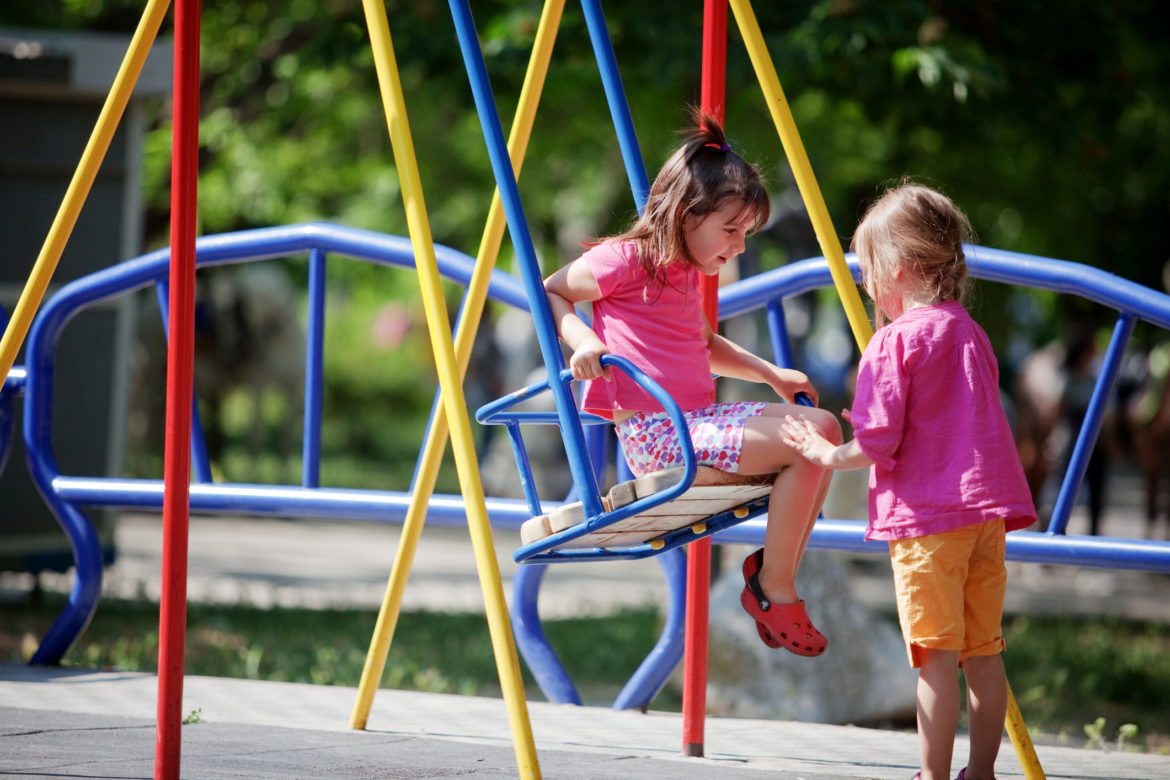It was one of the warmest days we’d had during the cold and dreary Indianapolis spring, and I took my three-year-old daughter, Lyra, up to Broad Ripple Park after I picked her up from daycare. As we stepped foot on the worn mulch, Lyra took a deep breath and exclaimed, “Fresh air!” She gets this saying from me, and it makes me grin with pure joy each time she says it. I want to teach her to enjoy the smallest pleasures of life that are available to each and every one us, things that are as simple as the brisk inhale of the outside world on a perfect spring day.

We enjoyed running and playing with the other kids, everyone happy to be out of the house and letting out some energy. Lyra commenced a game of ice cream shop, tucking herself behind a piece of playground equipment as a makeshift service counter. “What do you want, Mommy?” she would chirp, and I’d make my request, then she would turn and cobble together some mulch and hand me my ice cream cone. After a few minutes, a little boy and his mother wandered over, his curious and sweet expression indicating he wanted to play ice cream shop, too. Lyra smiled and offered him a cone. I greeted them and waved them closer. As the little boy rounded the corner, his torso came into full view. He was missing his left arm from the elbow down.
The moment happened so quickly.
I had no time to prepare Lyra, no heads up to help position her reaction. She immediately recoiled in horror and began screaming, an instinct so strong and sudden that I could do nothing to dampen it. “Where is his arm, Mommy? What happened to his arm?” she repeated, again and again, her voice hysterical. She clutched my legs frightfully. Internally, I panicked.
Most of the time, parenting feels like living life, but with a kid. I often feel like I’m just sort of floating along, doing my best to guide her and teach her, but basically just hanging out with my little buddy. But then there are moments that are so clearly PARENTING MOMENTS. As I stood there, nervously trying to manage my toddler’s socially inappropriate reaction to a child with a physical difference, I knew I had never encountered a parenting moment like this. It was my responsibility to seize this teaching opportunity.
My first instinct was to encourage her to be kind and continue playing with him. I gathered Lyra on my hip and said, “It’s all right! This nice little boy wants to play ice cream shop with you. Is that okay?” Lyra nodded hesitantly and I put her down. She walked closer to the boy and asked him what flavor of ice cream he wanted. For one hopeful moment, I breathed a sigh of relief: she was going to play with him after all. But then he raised his shoulder and his physically different arm came into direct view, inches from Lyra’s face. She screamed and buried her face in my leg. “I don’t like his arm!” she cried again. “What happened to his arm??”
At this point, I apologized and pulled her away. We walked out of earshot of the little boy and his mom, and I worked on unpacking her fear. I told her it was okay to be scared because she had never seen this before. I explained to her that everyone is different: each person looks different, has a different personality, and different experiences. I tried to use an example to illustrate my point. “What if every single person on this playground looked like Mommy? You wouldn’t be able to find me if everybody looked the same! Every person looks different, and that is what makes each of us special.” She wasn’t convinced, her face still cloudy with fear and uncertainty. “But what happened to his arm?” she asked. I told her I didn’t know–that perhaps there was an accident, or maybe that’s just how he was born, but he was playing and having fun just like any other kid and deserved our kindness like every other person.
Lyra and I talked for nearly 20 minutes, and I kept glancing over at the little boy as he ran, jumped, and went down the slide again and again. He was a sweet, energetic, and rambunctious kid, managing the playground perfectly well alongside his peers. I spotted his mom standing nearby, smiling and cheering him on. I wondered how many times she had been in this situation: a random child (and probably even grown adults who should know better) treating her happy kiddo like a freak. It broke my heart to think how she must feel each time her son is treated like an outcast just for a small physical difference that isn’t his fault and doesn’t hold him back. Does the sting still register, or has she become numb to it by now? I felt horrible that my child had contributed to her heartache.
I wasn’t able to convince Lyra to play with him, despite talking over the situation thoroughly. At just barely three years old, she’s old enough to really notice differences but not old enough to conceptualize social norms and overcome her initial shock. We left the playground and continued talking all evening. As soon as my husband got home, Lyra confessed the entire episode, telling him she “met a little boy who didn’t have an arm and didn’t want to play with him, but that’s how he was born.” I was relieved that at least some of our talk had sunk in.
At the advice of my best friend (a pediatrician), I put on an episode of Daniel Tiger’s Neighborhood called Daniel’s New Friend, in which Daniel meets a girl who uses braces to walk. The episode emphasizes that we all look different on the outside, but are the same inside.
And since that day at the park, we have continued the conversation about physical differences. The next time we went to the park, I asked Lyra what she would do if we met someone who looked a little different. “I would be scared,” she said, “But I would be kind to him, and I would play with him.”
If I could go back in time, here’s what I would do differently in this situation
1. Start the conversation early.
I wish we had talked with Lyra about people with physical differences proactively. I felt completely unprepared for that moment, and Lyra was unprepared, too. It was like a huge blind spot in my parenting appeared just as it was too late. Perhaps if I had primed her with some information about what to expect, her reaction would not have been so severe. I know that I did the best I could at that moment: I acknowledged that her fear was normal, helped her understand, and taught her the importance of being kind. It would have been helpful to have a concrete reference point, like the Daniel Tiger episode.
2. Talk to the child’s mother.
Looking back I wish I had gone up to the child’s mother and said, “Hi, I’m Lauren and this is my daughter, Lyra. This is the first time she’s met someone with a physical difference like your son’s, and I’m so sorry for her rude reaction. Is it okay if we ask a couple questions to help her adjust? We’d love to be friends!” I know that pulling her away when she began freaking out was probably a good call, but I also wish I would have acknowledged what was happening and bridged the divide between us in that moment.
3. Brush up on my language
I remember not having the right words in the embarrassment of that moment. I think I made some comments about the boy that might have come off as condescending or minimizing, such as, “He’s just like any other little boy!” I wish I’d done some reading about children with physical differences and brushed up on the recommended language and approach before I was actually in this situation. I found some helpful resources for the future here and here.
If you haven’t yet talked with your children about physical differences, I encourage you to find some resources and start the conversation now! It’s our job to mold our children into the kind and empathetic people we want them to become.









Thank you for writing this! Please remember to include children with invisible disabilities like autism. Some children look different and some act differently but they are all children who want to play and socialize!
Lauren, this was a learning event for two….or maybe four. You have provided excellent advice!
Lauren, as always, your thoughts reflect the kindness, love and compassion that infuse your life and perspective. Even for prepared, thoughtful parents, such as yourself, it is virtually impossible to not be occasionally blindsighted by an incident which involves your child.
In your follow-up to the playground incident, you and your husband, Jeff, continued to thoughtfully explore the differences topic with Lyra. You sought out a pediatrician’s opinion and showed Lyra the Daniel Tiger video episode relating to differences. I’m sure you’ll discuss the playground incident again if it comes up in future conversations. You continue to include caring teaching about sensitivity toward others for your child by her No. 1 teachers — her parents.
Comments are closed.